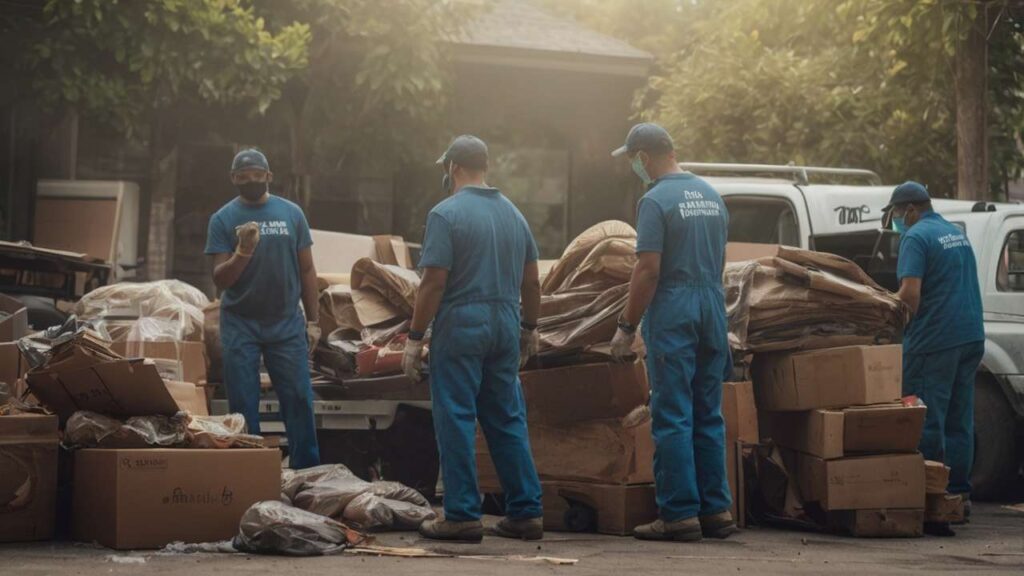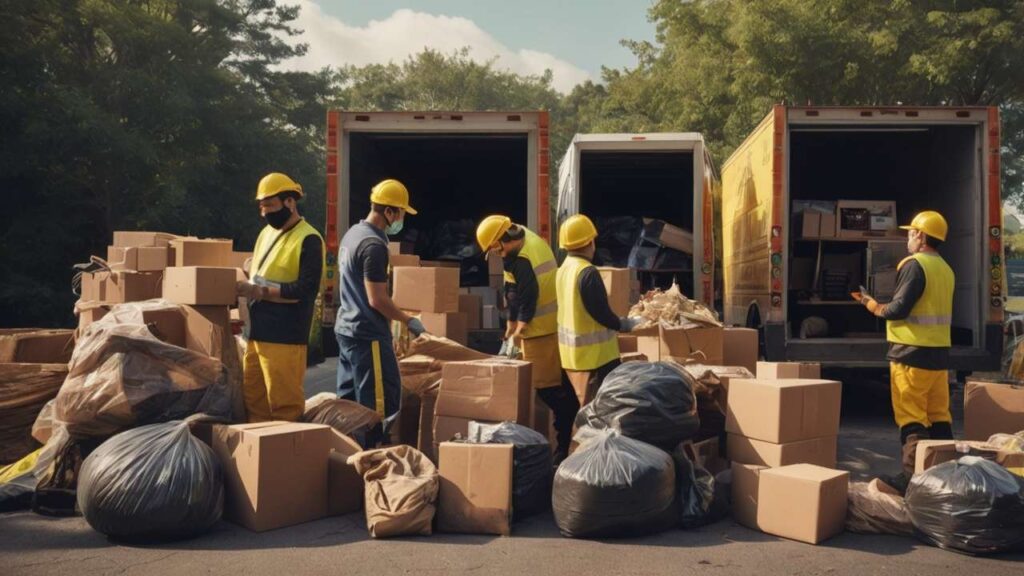Most people don’t realize how many items in their homes can’t simply be tossed into a black trash bag. Old laptops, a rusty can of paint, even the bottle of expired bleach under your sink — these aren’t “ordinary junk.” They fall under categories like e-waste and hazardous household junk, which are regulated because of the dangers they pose to people and the environment. That’s why the idea of legal junk disposal matters so much. I’ve seen neighbors toss broken TVs at the curb, only to watch the screen shatter and chemicals seep out. It’s unsettling, and it’s avoidable with the right knowledge.
Personally, I used to think electronics recycling was a pain. But after hearing from a local certified hauler in North Carolina, who said “even a small lithium battery can catch fire in a landfill truck,” I changed my perspective. It’s not just about following the law; it’s about protecting the people handling our waste and ensuring our community isn’t breathing in toxins later.
Why Hazardous Waste Needs Special Attention
Hazardous household junk covers things like old paint, pesticides, cleaning chemicals, automotive fluids, and certain electronics. Throwing these into the regular trash isn’t only illegal in many places — it’s dangerous. Chemicals can leach into soil and groundwater, electronics can release heavy metals, and some items are outright fire hazards.
Experts in environmental safety say a single gallon of improperly disposed motor oil can contaminate up to a million gallons of water. That’s huge. Compare that to a professional junk removal service that knows the rules, has the tools, and can ensure the waste goes where it’s legally supposed to. Services like trusted junk removal experts in North Carolina exist to take that stress off your shoulders.
I’ve had the experience of hauling an old CRT monitor to a county drop-off site — it felt odd, like babysitting a toxic dinosaur. But those old tubes contain lead glass, and without careful handling, they’re a health hazard. This is exactly why junk removal companies and certified recycling centers are worth their fee.
The Legal Side of Junk Disposal
E-waste disposal regulations and hazardous waste removal guides aren’t optional reads — they’re rules backed by fines. Local governments, and sometimes even federal regulations, outline what can and can’t be thrown away. Hazardous waste days are often set up by municipalities, and certified junk haulers are required to follow guidelines for both electronics and household chemicals disposal.
If you’re in North Carolina, there are multiple county programs where you can drop off things like paint, batteries, or electronics. But let’s be honest — not everyone has the time, the truck space, or even the desire to stand in line at a hazardous waste event. That’s where reliable professional services come in. Many of them not only collect your junk but also sort it, recycle it, and even donate items if possible. You can read more about how the best junk haulers work in this category of resources.
One of the smartest moves I’ve seen is combining a junk removal with a home cleanout. Think about it: you’re not just decluttering, you’re preventing illegal disposal fines and ensuring things like paint thinner or that half-used weed killer aren’t sitting in a shed waiting to leak.
Examples of Hazardous Junk We All Overlook
- Paint cans: A dried-out can might look harmless, but liquid paint can’t go in the trash. It has to be hardened first or taken to a disposal site.
- Batteries: Even small ones contain heavy metals. Rechargeables and lithium-ion are the most dangerous.
- Electronics: Laptops, game consoles, TVs — these are e-waste. A broken HDMI port may seem like junk, but the boards inside can be recycled.
- Cleaning chemicals: Old bleach, ammonia, solvents — if mixed improperly, they can release toxic fumes.
A friend of mine once mixed two leftover cleaning products while packing up an old house. Let’s just say it ended with windows open, everyone coughing, and a “never again” look on their faces. Small mistakes can be serious in this category.
Recycling and Repurposing: The Second Life of Junk
Beyond just disposal, a lot of household junk actually has a second life. Professional haulers often sort items to recycle, repurpose, or donate. I love the idea that a couch I thought was trash might get refurbished and help a family in need, or that scrap electronics might become raw material for something new. That perspective makes hiring professionals feel less like “throwing money away” and more like being part of a positive cycle.
This ties directly into the broader picture: how professional haulers recycle, repurpose, and donate. It’s not just junk removal; it’s a shift in how we see waste — from something useless to something with hidden value.
Emotional and Practical Dimensions
Disposing of hazardous junk isn’t always a cold, calculated process. Downsizing an estate or cleaning out after a loved one’s passing often means encountering decades of stuff — including hazardous materials. The idea of compassionate cleanouts recognizes that these aren’t just piles of junk, but personal histories mixed with practical headaches. I think that balance between respect and efficiency is one of the underrated benefits of working with trusted, reliable junk haulers.
Potential Future Topics That Naturally Flow
The conversation doesn’t stop here. Expanding on this subject, there are so many angles worth covering. For example, “smart disposal practices for landlords” could address how property managers handle hazardous junk after tenants leave. Another idea: exploring climate-friendly junk removal innovations, like electric-powered haul trucks or zero-landfill goals. Even a deep dive into the hidden cost of clutter — not just in space but in stress and productivity — connects back to why junk removal matters on multiple levels. These future discussions naturally continue the thread of responsibility, practicality, and even mental well-being tied to junk management.
Real-Life Case Study: A Local Example
One North Carolina family I spoke with hired a certified junk removal company after discovering decades’ worth of chemicals in their garage. There were multiple cans of gasoline, old pool chemicals, and several electronics. The removal cost around $350, which initially felt steep, but the company provided documentation showing everything went to certified disposal or recycling centers. The family later admitted the peace of mind — knowing there was no risk of fire or toxic leaks — was worth every dollar.
FAQs
Q1: Can I throw small electronics like cell phones in the regular trash?
No. Even small devices contain batteries and metals that can be hazardous. Always recycle or use e-waste collection points.
Q2: What’s the safest way to dispose of leftover paint?
If it’s latex paint, you can let it dry out completely before disposal. For oil-based paint, it must be taken to a hazardous waste collection site or handled by professionals.
Q3: Are junk removal services really certified to handle hazardous waste?
The best ones are. Always ask for proof of certification or permits. Reliable services will explain their process and show compliance with local regulations.
At the end of the day, legal junk disposal isn’t just about avoiding fines — it’s about protecting our homes, our health, and the environment. Whether you’re clearing out a single broken console or an entire estate filled with chemicals, taking the right steps matters. If this article helped clarify things, do me a favor: hit the share buttons below and pass it on. Someone in your network probably has hazardous junk in their garage right now and doesn’t know what to do with it.
For more resources, check out recommended junk removal experts in North Carolina or browse the junk removal category on Pro Service Tips.



